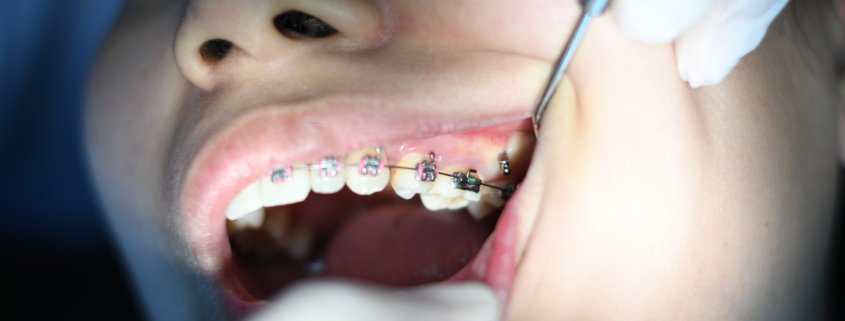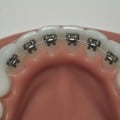Wisdom Teeth and Braces (All the Basics You Need to Know)
Are braces with wisdom teeth possible? Do wisdom teeth affect your orthodontic treatment? This may be a valid concern for you. You might wonder what wisdom teeth are or what they do in the first place. They are essential for oral health and have a place in the jaw structure as a whole. In this post, we’ll go through what wisdom teeth are and whether you need them removed for oral health or braces. Let’s get cracking.
What are Wisdom Teeth Anyway?
Wisdom teeth may come in unexpectedly when teens are approaching the age of eighteen. Wisdom tooth flare-ups can cause some havoc or they might emerge neatly and cleanly without any signs of their presence.
The last set of molars appear around ages 18-20 which means these pesky little third molars could be about ready to make themselves known by biting through gum tissue. The post-extraction healing process is aided by the age factors above.
Do I Need to Remove Wisdom Teeth?
If the teeth are healthy or they have fully erupted then there is no need to remove wisdom teeth. In terms of position, if they don’t force other teeth out of place then you’ll find no need for removal. Keeping your teeth clean and cared for also helps you keep your wisdom teeth.
Common Reasons to Remove Wisdom Teeth
Wisdom teeth often grow in an inconvenient location, which can cause problems with a shifting of other teeth and infection. When wisdom teeth don’t get enough room to fully develop they may erupt at odd angles causing pain for the patient as well as impacts on overall health. Such as cysts or gum disease that affect your jaw’s bone density.
Partial emergence through one’s gums also provides a breeding ground for bacteria leading towards decay inside this area. If left untreated it could lead to further complications including loss of teeth.
Wisdom teeth can crowd other teeth. This can cause structural damage to both teeth and gums. In these cases, a complete removal will preserve and protect the rest of your teeth.
What happens if I Don’t Remove Them?
Some dentists recommend the removal of the wisdom teeth even if they don’t fully emerge. Removing these is easier before age 18 because roots and bone haven’t yet formed in that area. Meaning less complicated extractions.
Teens often decide to get rid of their problem teeth now but that is not always the most effective oral health measure. It takes a lot to decide about removal. But if wisdom teeth are left in you may experience the following:
- Badly positioned wisdom teeth oral health by trapping excess food and debris. This leads to decay, not only for the wisdom tooth itself but for surrounding teeth as well.
- Wisdom teeth that haven’t fully erupted cause brushing and flossing concerns. The degeneration of oral tissues is a result.
- Wisdom teeth that have partially emerged allow bacteria to form on the gums. Cysts, inflammation, and other issues develop.
- An impacted, or buried wisdom tooth, can form a cyst on or near the tooth. This is filled with pus and damage surrounding tissues. It also affects the root, bone, and other teeth.
What About Removal For Braces?
It will depend on the structure of your jaw and teeth. It is not a prerequisite to have wisdom teeth removed for orthodontic braces.
As wisdom teeth come in, your orthodontist will monitor the health of these budding adult teeth and may recommend removal if they seem too close to other vital structures such as braces.
What is The Extraction Process?
The extraction process will start with a series of x-rays to determine how your wisdom teeth are positioned in the mouth. These illustrations can be useful for planning any procedures that may need doing.
If your wisdom teeth have erupted through the gum tissue, a local anesthetic or numbing agent might be applied before they proceed with an extraction. Once the numbness has taken effect and loose soft tissues around that tooth are removed.
The tooth is removed from its socket. After which the wound will be stitched up or covered with a dressing. This dressing will help to reduce infection. Post-op care includes following your dentist’s recommendations during healing for healthy teeth and gums while making sure you’re safe after surgery.
If you have an impacted tooth, then your dentist will need to cut deeper than before in order to complete the procedure. This might require sedation because there is more invasive work being done when removing such things from bone cells. Always follow recommendations on post-op care.
Conclusion
The above is a rough guide on what to expect in real terms. You can get all the information from Dr. Panucci at Beach Braces.
They have the experience and dedication to give you and your child the best possible service. If you have any further questions you can contact us TODAY.

Dr Patti Panucci attended the University of Louisville School of Dentistry for four years, where she graduated with a DMD degree (May 2000) among the Top 10 in her class. Following that, she headed west to Los Angeles to complete her three-year residency at one of the top-ranked orthodontic programs in the country – the University of Southern California.
Along with her certificate in orthodontics, Dr. Panucci earned a master’s degree in craniofacial biology. During those three years, she fell in love with Southern California beach life and decided that this was where her future lay.












Leave a Reply
Want to join the discussion?Feel free to contribute!